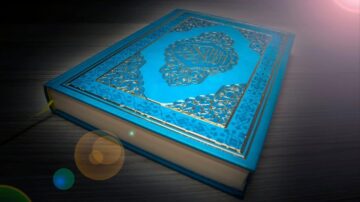One of the Qur’an’s most important attributes is that it reached us in the very form in which it was revealed to Prophet Muhammad (peace and blessings be upon him). Allah promised to protect it: (We have sent down the Reminder, and We will preserve it) (Al-Hijr 15:9). The divine scriptures that were revealed before Islam lost their original forms over time; they are either incomplete or not fully accurate. In the case of the Qur’an, however, Allah placed the revelations into our Prophet’s memory. In addition, after he received each revelation, the Prophet told his numerous Companions to write them down, thereby ensuring the Qur’an’s preservation in its original textual form. Caliph Abu Bakr (632-634) had the Qur’an compiled into a single copy, and Caliph `Uthman (644-656) had copies of it sent to important Islamic cities. The following verses explain how the Prophet tried to remember the revelations, and how Allah helped him do so:
(Do not move your tongue trying to hasten it. Its collection and recitation are Our affair. So when We recite it, follow its recitation. Then its explanation is Our concern) (Al-Qiyamah 75:16-19)
As the verses maintain, the Prophet remembered the Qur’an in a unique way, for Allah implanted its verses in his mind. As his Companions wrote it all down while he was still alive, in compliance with Allah’s promise, each of its letters has remained unaltered since the beginning of its revelation over 1,400 years ago. Therefore, Allah’s revelation has survived intact to our day.
The Qur’an’s lack of any internal contradiction and discrepancy also shows that it is from Allah and is immune to change. The Qur’an is internally consistent and in full agreement with historical developments and scientific discoveries. This attribute is so certain and explicit that our Lord stated,
(Will they not ponder the Qur’an? If it had been from other than Allah, they would have found many inconsistencies in it) (An-Nisaa’ 4:82)
Many contradictions can be found in regular books. However, every word of the Qur’an is in full agreement with the others. In addition, the Qur’an provides information about previous generations, communities, different forms of administration, military strategies, and many other subjects, as well as about past and future events. The Qur’an also is in absolute agreement with historical facts as well as all developments that occurred after its revelation. For instance, the first verses of Surat Ar-Rum (the Romans) state that the Romans would suffer a defeat, but nevertheless would be victorious shortly thereafter:
(Alif, Lam, Mim. The Romans have been defeated in the nearer land, but after their defeat, they will be victorious in a few years’ time) (Ar-Rum 30:1-4)
In fact, Byzantium had been so severely defeated that its very survival was in question. Thus, its predicted victory seemed impossible to many, including the Arab polytheists.
In December 627 CE, the Byzantine and Persian Empires fought a decisive battle at Nineveh. This time, the Byzantines unexpectedly defeated the Persians. A few months later, the Persians had to make an agreement with Byzantium, which obliged them to return Byzantine territory. At the end, “the victory of the Romans” that Allah promised miraculously came true. This one example alone provides evidence that the Qur’an is the word of Allah.
Another attribute of the Qur’an is that it contains key facts about many subjects (e.g., astronomy, physics, and biology), at a time when people knew very little about such things. The Qur’an was revealed to the inhabitants of seventh-century Arabia, whose society contained many superstitious and groundless beliefs that were considered “scientific.” Lacking the technology to examine the universe and nature, they believed in legends inherited from past generations.
Several scientific truths only recently uncovered by technology were stated in the Qur’an 1,400 years ago. Such facts are further evidence that the Qur’an is the word of Allah.

